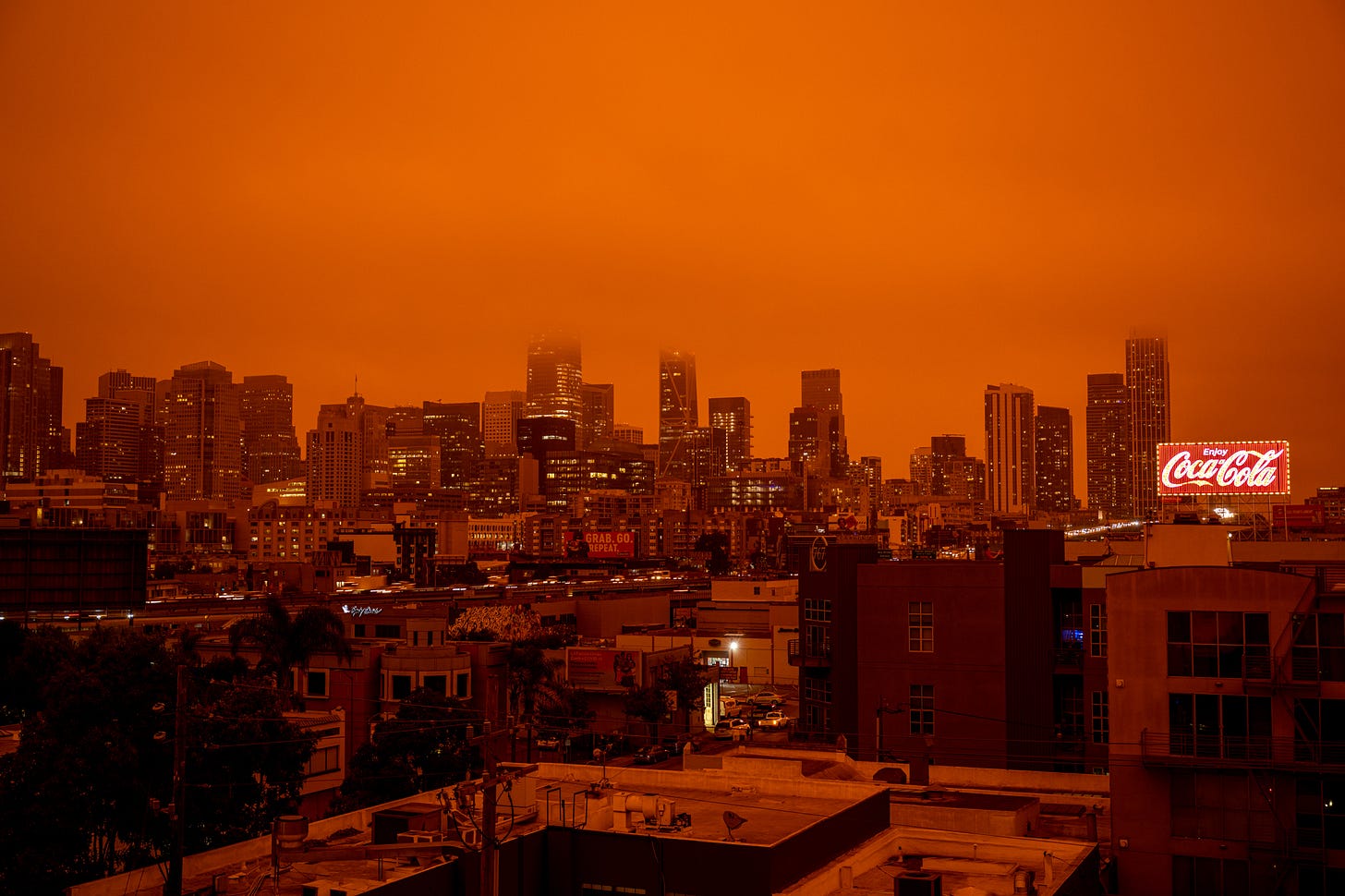towards 2021
reconciling different selves, fiction as a tool for demonstrating principles, and the evolution of the passion economy
this is an occasional compilation of my thoughts and curiosities. If you find the thoughts or resources interesting and want to receive more, you can subscribe here.
Hi all, hope everyone had a restful holiday season despite the fact that the craziness of 2020 is following us into 2021. As much as the weight of the feeling that the world is actively crumbling around us, I've been trying my best to be fully present to enjoy time with family at home, stay focused at work with 2 new engineers joining my team, and, as an escapist mechanism, consuming trash tv (Schitt's Creek, although it actually has some noticeable character development which is nice). I just got back to San Francisco after being away for almost 2 months, and the sudden shift from the bustling, normal-like ambiance of Houston to the ghost-town-esque streets of downtown SF is dizzying, even as both places see COVID cases spike. It almost feels like we’re stuck in a loop, returning to a year ago when we first began the lockdown: empty streets dimly lit by rows of street lamps, wisps of light forming apparitions of the mind showing the Saturday night bustle of a different lifetime. I'm hoping for the best with the vaccine rollout and getting the virus under control to a point where life can start to feel less suffocating and a constant decision between what is right or wrong.
✍️ In writing land, I recently wrote about my commitment to 2021 to trusting myself to take risks, in other words, to gamble. Would love to hear tips for what has worked or stories of similar undertakings in order if it sparks any ideas :)
recent musings
🪞 our different selves: I've been thinking a lot about the phenomenon of people having different identities with different groups. As a simple example, imagine how your behavior changes depending on whether you’re with your parents, your friends, your coworkers. The air changes depending on who you’re with, where you are, what you’re doing and coalesces around something that’s appropriate for all those things. In this sense, we’re fluid beings and are constantly adapting to tiny perturbations in our surroundings to maximize our survival. One common coalescing center is through including everyone, which involves bringing any group dynamic to the most common denominator of "eligible" topics. Upon first glance, this seems like a good adaptation, but it causes a direct conflict with the principle of authentic expression, which involves allowing anyone to fully express their identity even if it means topics that not everyone will understand (a form of exclusion), whether it be family background or cultural references. In some cases, we feel ourselves transforming into a version that hides our authentic, at-rest (what I've come to start calling null self, in a play on the null hypothesis) identity. If you've ever felt an internal conflict of returning to your high school environment and home or the pressure to stop sharing a personal experience as your boss walks into the room, you've experienced this pressure to conform to the "normal" standards of society (Interior Chinatown satirizes this as the pressure on Asian-American actors to become “kung fu guy”). Of course, power dynamics plays a big role in causing people to conform to certain kinds of behavior. However, we also see this play out at a larger scale across America. For example in recent perturbations from the conflict in our world, the BLM protests and the insurrection at the Capitol are both examples of some segment of society fighting against the pressure to conform that they experience (a society that has been structured to mistreat black and brown people vs. a society that is becoming diverse and globalized). Within the segment, there's also an overwhelming pressure to conform to the segment's dogma, and the very air propels you towards this shared group identity (Eric Hoffer in The True Believer describes this as “self-renunciation”). In some ways, it’s freeing to just let the tide push you instead of constantly fighting to express yourself. In other ways, becoming part of the tide is the same as disappearing—your individual self consumed by the “consummate” whole. There are certainly domestic terrorists and other deliberate instigators that were part of the mob on Wednesday, but it's just as certain that there are a significant amount of others that followed along because they saw themselves as defenders of liberty, and it was the “default” choice given. What's the right balance of adapting your identity to your environment and maintaining your null self and how do you cultivate a default to express your null self rather than conforming to the easy path? What's societal norms will allow us to promote self-expression while giving opportunities for people to connect and engage at a fundamentally human level? How can we change the default environments of society so that people grow up appreciating diversity and wanting to understand others? What even are the defaults that we want society to instill in people? If it were up to me, I’d get more people to listen to understand rather than to argue, to appreciate the joys granted by the simple things rather than constantly striving for the next big thing, to love and laugh and cherish as if they are freely produced rather than reserved for a special occasion.
🦄 purpose of fiction: I've also been enjoying a lot of fiction writing lately and thinking about how it involves weaving a story in order to demonstrate some principle (conventionally referred to as the "moral of the story"). Fiction is crafting stories that blend enough elements of reality with a compelling narrative to demonstrate some belief in an understandable and sympathetic manner, a subtle shifting of readers' perspectives towards that of the principle. Ted Chiang, author of some fantastical short stories, calls this writing “stories that literalize metaphors”. It reminds me of a philosophy in product development of building prototypes that demonstrate an extreme point of view (a principle that was formalized to me by Lane, Coda’s head of product) in order to smoke-test the underlying assumption or principle for how the product should behave and how it influences users to act.
🔨 balancing niche with shared understanding: Another phenomenon on my mind is the passion economy / creator economy and how it's going to evolve moving forward. The thesis is that our economy is increasingly moving towards one that encourages people to be financially independent from a company through their personality and creative pursuits. We saw this originally happen with platforms like Youtube and Instagram, although the dynamics of those platforms produce superstars, people who were known to all users of the platform. Now, we're seeing smaller players emerge with sustainable lifestyles without having to win over millions of users, just 1000 true fans. This phenomenon plays out on platforms like Twitch, Patreon, OnlyFans, etc. There's less of an emphasis on needing to appeal broadly to a massive audience; instead, you are rewarded for focusing on a very specific niche that will appeal strongly to a small audience. We see this also in the rise of media sites that are deliberately catered to a specific political bent, ex: breitbart and nowthis. And here at Coda, it's something we're banking on too, that catered niche software will always work better than one-size-fits-all general software. Li Jin from a16z posits the idea of creating a middle class for the creator economy and what is needed to get more and more creators to achieve the 1000 true fans needed for sustainability rather than shooting for a million fans. One structural problem that emerges in my mind that requires a novel solution for this world to work is information overload. As of now, there's already so much content and content creators that one can consume and subscribe to, that we mostly let the algorithmic feeds of social media and content platforms serve us what they think we want to see. How can we solve the problem of discoverability for an exponential increase in creators while ensuring that people aren't overwhelmed with options (free choice paradox)? Another question it brings to mind is: do we want this to be the default for our future society? The proliferation of the niche is incentivizing people to value niche-ness, in of itself, and embodying principles to the extreme, rendering coming together to form consensus on some universal foundations unnecessary. A focus on individual creators can also lead to a very American-dream-esque call to action, a message that “you can empower yourself by creating” while still cultivating a dynamic that causes the largest winners to take the lion’s share of benefits. Is there a way to form a system that allows any creator to rise to sustainability through their work without requiring creators to “play the game” of social media platforms to gain virality?
some more reading:
Working in Public by Nadia Eghbal
some things I enjoyed consuming
a sun (陽光普照): a gripping, emotional, and powerful Taiwanese movie that is available on Netflix
Interior Chinatown: as my hastily written goodreads review states, "Wow this book left me speechless. It took my breath away with its hypnotic style intermingled with poignant commentary and an ever-blurred line between what’s real and what’s imaginary. Yu conveys his point about the blurred line between performance and real life perfectly through the medium and style while doing proper justice to the very complicated story of the vast variety of Asian Americans"
The Opposite of Addiction - Your Undivided Attention: an intriguing frame on how we can fight addiction (specifically to social media) with connection. The podcast frames the problem in that social media promises us the appearance of something that we desperately crave (meaningful connection), but in reality, gives us none of the substance of that with the infinite feeds and the shallow content.
If any of this perked your interest or caused you to instinctively object, I’d love to hear your thoughts. Just reply with whatever is on your mind!
the fun box
i picked out my favorite photos from 2020 :)
Spencer
If you think someone else you know would enjoy this, feel free to share with them the newsletter.






oops one correction to this is that Ken Liu not Ted Chiang talked about stories that literalize metaphors. I got two of my favorite authors confused!